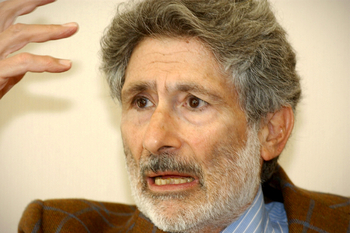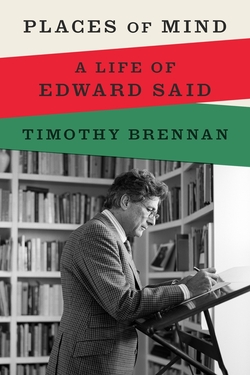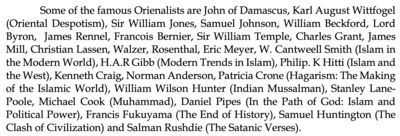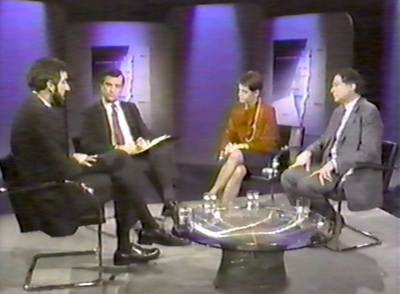 Edward Said. |
1. The revenge began in 1985, when he devoted nearly a thousand words to my book, In the Path of God: Islam and Political Power (New York: Basic, 1983) in a screed titled "Orientalism Reconsidered." Here are some of the learned professor's choice insults:
- My expertise "is wholly at the service not of knowledge but of an aggressive and interventionary State - the U.S. - whose interests Pipes helps to define."
- "intellectually scandalous generalizing"
- "Pipes's book testifies, I think, to Orientalism's unique resilience, its insulation from intellectual developments everywhere else in the culture, and its antediluvian imperiousness as it makes its assertions and affirmations with little regard for logic or argument."
- "although Pipes pays his obeisance to imperialist Orientalism he masters neither its genuine learning nor its pretense at disinterestedness."
- "This [book], I submit, is neither science, nor knowledge, nor understanding: it is a statement of power and a claim for relatively absolute authority. It is constituted out of racism, and it is made comparatively acceptable to an audience prepared in advance to listen to its muscular truths.
- "Pipes obdurately and explicitly aligns himself with colonial Orientalists like Snouck Hurgronje and shamelessly pro-colonial renegades like V.S. Naipaul, so that from the eyrie of the State Department and the National Security Council he might survey and judge Islam at will."
 My view from the State Department's Counselor's office, 1983. |
(b) Said argues in Orientalism that European specialists on the Middle East de facto served their governments, that their studies were therefore tainted by imperialism. How amusing, then, to see this grand thesis applied in miniature against me: Because I worked at the State Department in early 1983 when In the Path of God appeared, therefore I must have offered in my book the U.S. government point of view. Or, in his colorful words, I was "wholly at the service ... of an aggressive and interventionary State."
Two little problems with this thesis, however: I was a Council on Foreign Relations fellow at the Department of State for a single year, not a State employee, as part of a program for academics to get a feel for government; and that was my only stint in government other than teaching at a military institution and taking on some small assignments (such as serving as a delegate at the United Nations Commission on Human Rights and serving on the Fulbright and U.S. Institute of Peace boards). My career in the academy and in think tanks shows abundantly that I say and write what I think, regardless of official U.S. policy.
Second, while serving in the State Department, my views so clashed with those of my superiors that I on several occasions (notably, with regard to policy vis-à-vis Lebanon) went public with my analyses after they failed to win support within the building.
That Said blithely identifies me with the U.S. government shows both his blind subservience to a theory and his famously shoddy research.
2. In a hugely negative review (in the Nation, Oct. 19, 1985) of From Time Immemorial: The Origins of the Arab-Jewish Conflict over Palestine by Joan Peters, Said called me a "seasoned pro." That was a unique compliment, and the more surprising for my having had my Ph.D. then for only seven years.
 Said speaking at the MESA meeting in 1986. |
the media can call on a substantial roster of experts who regularly represent the Middle East for the U.S. media and U.S. policy. Note - and here i's must be dotted - that this roster virtually - but not completely - excludes Muslims and Arabs - although many are available; it includes people whose political sympathies are clearly inscribed in what they write, although-and this is the pity of it - some of the scholars persist in characterizing what they do as impartial, or detached, or expert. This is the point, and it raises to me the profoundly interesting question of how these scholars continue to practice their art while remaining hostile, or at least antithetical to and substantially reserved, about its central object: the religion and culture of Islam. The roster I have in mind is responsible for what is essentially the entire gamut of media representation of the Middle East. It includes: Bernard Lewis, Elie Kedourie, Walter Laqueur, Ernest Gellner, Conor Cruise O'Brien, Martin Peretz, Norman Podhoretz, J. B. Kelly, Daniel Pipes - I could go on.
My response: What a great list to be included in, especially as I am a generation younger than the other unworthies.
4. In "Orientalism Revisited," Middle East Research and Information Project, July 1987, Said reprised his name-calling but this time with a back-handed compliment. Asked about the receptivity of Middle East specialists to his arguments, he replied:
Yes, I think we can see the beginnings of a new kind of scholarship which Orientalism was incapable of developing. The other thing is the rather more frank admission on the part of a lot of people in Middle Eastern studies that the field is highly political in nature and therefore the likely site of open contests. People take sides much more openly. People are known, in terms of their scholarly work in Middle Eastern studies, to be openly Zionist or anti-Zionist, or openly imperialist or anti-imperialist. The appearance of new apologists, such as Daniel Pipes and Barry Rubin, has made the debate more open and therefore more lively.
Edward Said and I debated on television many times. Here's one example, from February 11, 1988: I am at the left, then Morton Kondracke (the moderator), Helena Cobban, and Said.
5. In "The Middle East 'Peace Process': Misleading Images and Brutal Actualities," The Nation, October 16, 1995, Said included me in a list of people he disliked:
Much of what Oslo II prescribes so disadvantageously for Palestinians-- and, in the long run, for Israelis as well-was set in motion by Oslo I. You wouldn't know this from conventional "expert" opinion in the West. The prevailing belief underlying most analysis--from such dubious authorities as Bernard Lewis, Judith Miller, Steven Emerson, Daniel Pipes, and others--has been that now the only serious obstacles to peace are Islamic fundamentalism and terrorism. In this, the experts have followed the politicians.
6. In "A Devil Theory of Islam," The Nation, August 12, 1996, Said listed me as one of those phonies who demonize Islam to make fame and fortune:
What matters to "experts" like [Judith] Miller, Samuel Huntington, Martin Kramer, Bernard Lewis, Daniel Pipes, Steven Emerson and Barry Rubin, plus a whole battery of Israeli academics, is to make sure that the [Islamic] "threat" is kept before our eyes, the better to excoriate Islam for terror, despotism and violence, while assuring themselves profitable consultancies, frequent TV appearances and book contracts. The Islamic threat is made to seem disproportionately fearsome, lending support to the thesis (which is an interesting parallel to anti-Semitic paranoia) that there is a worldwide conspiracy behind every explosion.
7. In the 1997 edition of his 1981 book, Covering Islam (text here) Said has much to say about an article of mine that appeared two years earlier:
Or consider Daniel Pipes, а perfervid anti-Muslim whose main characteristic is that as an Orientalist he "knows" Islam for the appallingly dreadful thing that it is. He delivers himself of some reflections in а "think" piece published in the Fall 1995 issue of The National Interest under the modest title "There are No Moderates: Dealing with Fundamentalist Islam." Nowhere in the piece does he absolve radical Islam – which he does not. bother to define, but which his title lets us assume is the same as the nonradical variety – of its real nature which, he tells us right off, is "closer in spirit to other such movements (communism, fascism) than to traditional religion." А little later, he develops the analogy further: "While fundamentalist Islam differs in its details from other utopian ideologies, it closely resembles them in scope and ambition. Like communism and fascism, it offers а vanguard ideology; а complete program to improve man and to create а new society; complete control over that society; and cadres ready, and even eager, to spill blood." Pipes ridicules those experts who say that political Islam has run its course; no, he offers by way of counterargument, its heyday is upon us now. Violent, irrational, unappeasable, totally uncompromising, Pipes's "fundamentalist" Islam threatens the world, and especially "us," even though, according to State Department figures, terrorism originating in the Middle East is sixth in order of occurrence and frequency.
In short, fundamentalism equals Islam equals everything-we-must-now-fight-against, as we did with communism during the Cold War; in fact, Pipes says, the battle is graver, more profound and dangerous with Islam. Neither Pipes nor [Peter] Rodman writes as an outsider, nor as а member of а lunatic fringe. Their work is thoroughly mainstream and is intended, with some realistic expectation, for the serious attention of policymakers.
 Where does one start?
Where does one start?
My favorite part is "Pipes ridicules those experts who say that political Islam has run its course," a reference my scathing 1995 review of The Failure of Political Islam by Olivier Roy. Well, Ed, I guess I was right on that one, no?
Said's attributing to me the view that Islam is an "appallingly dreadful thing" is typical of his sloppiness; I consider fundamental Islam, not Islam as such "appallingly dreadful."
His insisting that I make no distinction between fundamental Islam and Islam is worse than sloppy; it's malign. Note these two sentences, from that 1995 article that Said discusses: "It is necessary to distinguish between Islam and fundamentalist Islam. Islam is an ancient faith and capacious civilization; fundamentalist Islam a narrow, aggressive twentieth-century ideological movement."
8. In a 2003 collection of interviews with Said, Culture and Resistance, he refers to Campus Watch on p. 177:
the situation on campuses has been further inflamed by the existence of a Web site which is designed specifically to report academics who criticize Israel or who seem to be proponents of the Palestinians. It's led by someone named Daniel Pipes, who is basically a second-rate, unemployed scholar.
Which rate scholar I am is a matter of opinion, but my being unemployed or employed is a matter of fact. As it is, I happen to be gainfully employed, with both a downtown 10th-floor corner office and a W-2 form to prove it. Thus, the University Professor of English and Comparative Literature at Columbia University has gotten the facts wrong – hardly surprising, as biographical accuracy, even about his own life, has not been Edward Said's strong suit.
More to the point: think tanks (like the Middle East Forum) have emerged in the last couple of decades as leading actors in the making of public policy, much to the frustration of the academic thought police. University employees moan about our being "grossly misinformed" and call us unflattering names like "policy entrepreneurs," or even deny that we are employed. But we think tankers provide timely analysis and often sensible advice, so we are listened to.
Also, of course, Campus Watch is not about reporting "academics who criticize Israel or who seem to be proponents of the Palestinians." But asking Said to get this right would be too much to ask for.
9. Writing today at "Dignity, Solidarity and the Penal Colony," at Counterpunch (an excerpt from The Politics of Anti-Semitism, edited by Alexander Cockburn and Jeffrey St. Clair), Said discusses
the vicious media and government campaign against Arab society, culture, history and mentality that has been led by Neanderthal publicists and Orientalists like Bernard Lewis and Daniel Pipes has cowed far too many of us into believing that Arabs really are an underdeveloped, incompetent and doomed people, and that with all the failures in democracy and development, Arabs are alone in this world for being retarded, behind the times, unmodernized and deeply reactionary.
This phrase "Neanderthal publicists and Orientalists like Bernard Lewis and Daniel Pipes" elicits several responses:
(1) How much preferable this is to the "somebody named Daniel Pipes" formulation.
(2) How good to be paired with Bernard Lewis, the doyen of Middle East historians.
(3) How impressive to be called an Orientalist by the person who transformed this honorable old term into an insult.
(4) How complimentary to be called an Orientalist, putting me in the grand tradition of Silvestre de Sacy, Edward Lane, Ignaz Goldziher, and Max Müller.
(5) How satisfying to see that Said is reduced to writing for the whacko-left website Counterpunch.
(June 23, 2003)
 Sep. 25, 2003 update: Said died today. He can insult me no more.
Sep. 25, 2003 update: Said died today. He can insult me no more.
Oct. 2, 2003 update: For a frighteningly awful eulogy of Said, see that by his much-titled colleague, Hamid Dabashi, which I have helpfully excerpted.
Mar. 1, 2007 update: Martin Kramer writes (in a review in Commentary of Dangerous Knowledge: Orientalism and its Discontents by Robert Irwin) that "there are no self-declared Orientalists today." I guess he missed this weblog entry. Also, I wrote in my 1983 book, In the Path of God, "I approach the subject of Islam and politics from within the Orientalist tradition of European and American scholarship." (Additionally, Irwin writes of himself in his book, "I am an orientalist.)
Dec. 21, 2008 update: I was hardly alone in being insulted by Said. Efraim Karsh and Rory Miller provide a helpful listing:
Said launched ad hominem attacks on major intellectual figures with whose views about the Middle East he disagreed. To Said, Paul Johnson, the renowned British writer, was a "retrograde social and political polemist" while Daniel Pipes, founder of the Middle East Forum and publisher of the Middle East Quarterly, was a "Neanderthal." Bernard Lewis, the eminent Princeton historian who challenged Said's Orientalism in the New York Review of Books, was guilty of "distorting truth" and had an "extraordinary capacity for getting nearly everything wrong." Said concluded that the polyglot historian "knows nothing" about the Arab world. Harvard political scientist Samuel Huntington, author of the influential Clash of Civilizations, Said wrote, "knows nothing about civilization, he knows nothing about history." Said wrote with similar vitriol toward social anthropologist Ernest Gellner and Middle East historian Elie Kedourie.
 July 22, 2015 update: Edward Said's mention of me continues indirectly, for example in Imperialism Past and Present (Oxford University Press), a soon-to-appear book by Emanuele Saccarelli and Latha Varadarajan, two associate professors of political science at San Diego State University. For details, see "Dante, Chaucer, Shakespeare – and Me."
July 22, 2015 update: Edward Said's mention of me continues indirectly, for example in Imperialism Past and Present (Oxford University Press), a soon-to-appear book by Emanuele Saccarelli and Latha Varadarajan, two associate professors of political science at San Diego State University. For details, see "Dante, Chaucer, Shakespeare – and Me."
Dec. 21, 2018 update: Humaira Riaz and Samina Qadir, writing about "A Critical Enquiry of Racism 'within the idioms of religion' in America" in the Winter 2018 issue of FWU Journal of Social Sciences, published by Pakistan's Frontier Women University, state: "Daniel Pipes confessed that he knew 'Islam for the appallingly dreadful thing that it is'." She also attributes this same quote to me in her Ph.D. thesis submitted to the Department of English Linguistics and Literature, Fatima Jinnah Women University Rawalpindi, Pakistan, "Racism and Islamophobia: A Critique of Selected American Literary Texts."
Comment: So, first Edward Said mis-characterizes my view of Islam (search above for "appallingly" to see the details) and second, these two clowns ascribe his description to my own writing. That's scholarship about Islam for you. It's not the first time this two-step error has happened to me, either; see my "The Problem with Middle East Studies: A Microscopic Investigation" from 2008.
May 20, 2019 update: Said may be dead 16 years but his style of litanies continues: Adam Shatz writes in the New York Review of Books that "Orientalism is, at its core, a critique of the expert, the producer of knowledge about the Arab-Islamic world, from Flaubert and Montesquieu to Bernard Lewis and Daniel Pipes." Once again, pretty illustrious company, no?
Dec. 1, 2019 update: Jamil Asghar, Muhammad Iqbal, and Khurram Shahzad compare me (and others) to Gerard de Nerval, Flaubert, Chateaubriand, Baudelaire in their article, "The Challenge of Quranic Translation and the Question of Gender Accuracy," published in the Pakistan Journal of Languages and Translation Studies. Nice.
Dec. 23, 2019 update: Iraqi intellectual Khazal al-Majidi traces what he calls "the new orientalism" back to 9/11 in a discussion titled Religions or Myths with the Egyptian journalist Ibrahim Issa. Majidi dwells at length on an eccentric list of individuals in this connection: Bernard Lewis, Francis Fukuyama, Samuel Huntington, Daniel Pipes (at 19:10), Bat Ye'or, Bernard-Henri Lévy, John Esposito, Paul Richards, Ernest Gellner, Patricia Crone, Michael Cook. And this nonsense appears on Alhurra, the U.S.-taxpayer funded television channel.
 Khazal al-Majidi in conversation with Ibrahim Issa on Alhurra |
Oct. 1, 2020 update: In an article on Libya in the Turkish journal Uluslararası Politika Akademisi, Mehmet Babacan reveals that there is an "Orientalist movement" and he exposes that Samuel Huntington, Elie Kedourie, and I are part of it. Sadly, the other two leaders being deceased, I now must run the operation on my own.
 Mehmet Babacan's article in "Uluslararası Politika Akademisi." |
Mar. 19, 2021 update: Because I spent one year (1982-83) working in the U.S. Department of State, Said wrote in 1985 (see the very first bullet in this blog) that I place my expertise "wholly at the service not of knowledge but of an aggressive and interventionary State - the U.S. - whose interests Pipes helps to define."
 Now, thirty-six years later, Said's admirer and biographer Timothy Brennan has taken this inaccuracy a step further in Places of Mind: A Life of Edward Said, writing about the debates between Said and his critics:
Now, thirty-six years later, Said's admirer and biographer Timothy Brennan has taken this inaccuracy a step further in Places of Mind: A Life of Edward Said, writing about the debates between Said and his critics:
More than a public drawing of swords, these encounters were often bitterly personal, in part because Orientalism portrayed Lewis, along with State Department intellectuals like Fouad Ajami and, somewhat later, Daniel Pipes, as the modern descendants of the racialized scholarship his book set out to expose.
"State Department intellectuals"? I expect the FSOs will enjoy that description as much as I do. As for "racialized scholarship," that's pure hokum; I challenge Brennan to find a single instance of my ever interpreting anything through race.
Dec. 31, 2021 update: Just in time for the new year, a new list of "famous Orientalists" has appeared in an article titled "Notion and Features of Orientalism in Historiography," compiled by Drs Muhammad Shafiq and Muhammad Ikramullah Khan, both of The Islamia University of Bahawalpur. I am thrilled to be included, for it includes such outstanding historic writers as John of Damascus, Samuel Johnson, and Lord Byron; such scholars of Islam as W. Cantwell Smith, H.A.R Gibb, and Patricia Crone; and a such renowned contemporaries as Francis Fukuyama, Samuel Huntington, and Salman Rushdie. Thanks!


